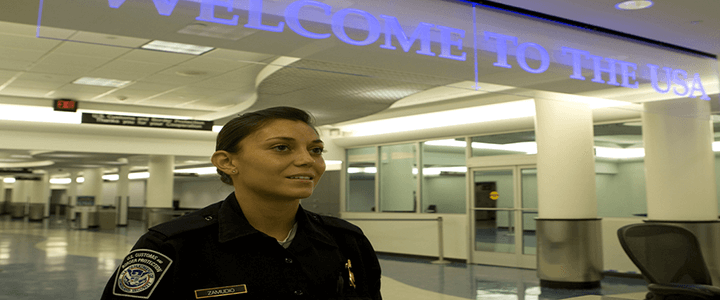The only Federal agency to make the 2019 Top 10 List of Best Companies for Veterans, the U.S. Customs and Border Protection (CBP) not only protects the public from dangerous materials and people coming across a border and into the United States, but also enables legitimate trade and travel at all ports of entry. On a typical day, they seize over 9,000 pounds of illegal drugs and apprehend over 900 suspects. And the positions available are as vast as the border – everything from budget analysts and paralegals to chemists and mechanics.
Uniformed positions at the CBP that are a good fit for veterans are categorized into three different branches:
- Border Patrol Agents
- Field Operations
- Air and Marine Operations
Border Patrol Agents
Law Enforcement agents working these positions “prevent terrorists and terrorist’s weapons from entering the United States by securing our land borders and coastal waters between ports of entry.” Border patrol agents use a variety of transportation methods to carry out their border protection duties ranging from 4WD pickups to horses, ATVs, dirt bikes and even bicycles.
Some agents are part of either a BORTAC or BORSTAR team. BORTAC teams respond to situations and threats based on intelligence from the Department of Homeland Security. BORSTAR on the other hand provides not only law enforcement, but also search and rescue, and medical response. Both teams can also be called to provide mutual assistance to local, county, state, tribal and Federal agencies when requested.
Field Operations
Like Border Patrol Agents, CBP officers working in Field Operations do many of the same tasks but in a more limited area. They are “responsible for border security, including anti-terrorism, immigration, anti-smuggling, trade compliance, and agriculture protection at U.S. ports of entry.” Work at the 328 ports of entry is faster paced than it is for Border Control Agents.
Field Operation Agents work U.S. border entrance/exit points. They are constantly searching people and many different types of vehicles of which some may be specially fitted to smuggle in contraband ranging from illegal drugs, to agricultural products and even people across any one of the U.S. borders.
Some Field Operation Agents are Agricultural Specialists and also look for plants and products that are either illegal, infested or contaminated.
Air and Marine Operations
While Border Patrol Field Operation agents work on U.S. terra firma, this branch does many of the same tasks but either in the air or on the water. On any given day, they “interdict unlawful people and cargo approaching U.S. borders, investigate criminal networks, and provide domain awareness in the air and maritime environments.”
Air Interdiction Officers patrol our borders from above using a variety of aircraft including fixed-wing, rotary-wing and drones. Being a pilot is one of the first requirements which makes these positions attractive for veterans with applicable military flying experience.
Aviation Enforcement Agents work with Air Interdiction Officers to detect, interdict and apprehend terrorists, weapons and contraband spotted from the air.
Marine Interdiction Officers do much of the same work as their Air Interdiction brethren, but they do their work on the coastal waters of the U.S. and Great Lakes.
While most CBP positions are open to veterans or transitioning military members in general, because of the demand of their military-learned soft and certain hard skills, having experience in law enforcement as an MP/AP/SP is beneficial as is having a degree in Law Enforcement or Criminal Justice.
For those interested in Marine Operations, a three-part vessel assessment is required. Those with on water experience, such as sailors and Coast Guard veterans, will do better on the assessment due to their experience with ships and cutters.
Why working for the CBP is good for Veterans (or anyone)
Working for the CBP provides several advantages. To start, you are continuing your service to your country. Another advantage is because the CBP is a Federal agency, time in the military counts towards retirement and leave accrual. Because the CBP is an agency authorized to use veterans preference, veterans can get up to 10 additional points which can put them higher on the hiring list than applicants without military service.
And one of the biggest advantages is the culture at the CBP is similar to what it is in the military as far as principles, teamwork, integrity, innovation and vigilance. If you loved that environment when you were in, you can love it again! One-third of CBP officers are military veterans, so you will feel right at home. Are you ready to join them?
Because the CBP uses the Veteran Recruitment Appointment (VRA) process, your recent military fitness test and medical examination records could shorten the time it takes to get hired. Plus, if you have a Top Secret/SCI security clearance granted without waiver and it is still current, you may be able to bypass the Polygraph portion of the application process.
Based on your prior military service, you could be wearing a CBP uniform in as little as 90 days.
Even if you’re not a veteran, CBP can be a great career of service with excellent opportunities, career potential and job security.



